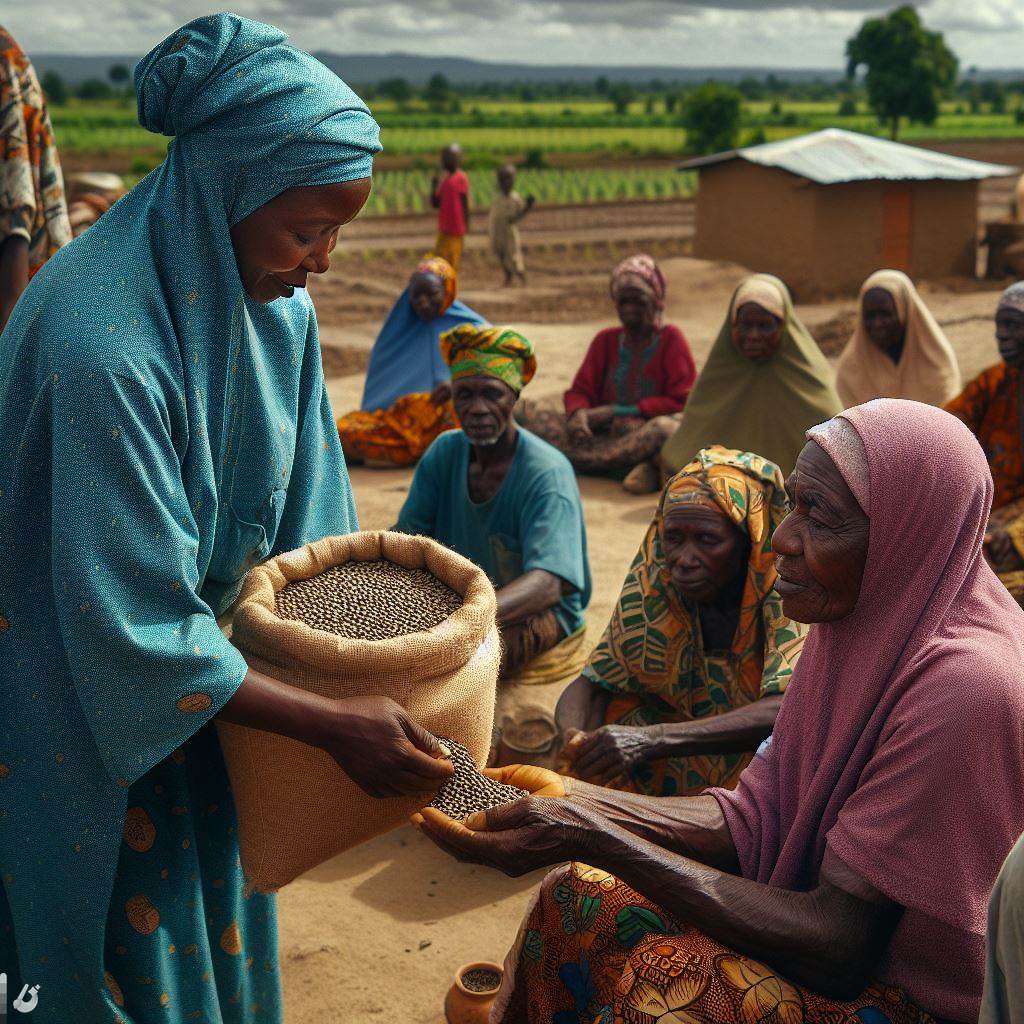Introduction
Role of Rural Development in Agriculture Boom: In Nigeria, where a significant portion of the population resides in rural settings, the vitality of agricultural development cannot be overstated.
The synergy between rural development and agriculture is not merely coincidental; it is a deliberate strategy to propel the nation into a new era of prosperity.
Rural development acts as the cornerstone, unleashing the untapped potential embedded in the heart of the countryside.
It goes beyond infrastructure; it’s about empowering communities, fostering innovation, and creating an environment where agriculture can flourish organically.
The significance of rural development reverberates in the increased productivity of farmers, the creation of sustainable livelihoods, and the reduction of poverty.
It is a dynamic force that propels the nation forward, breaking the shackles that hindered agricultural growth in the past.
As we delve deeper into the sections that follow, we will unravel the nuanced facets of rural development in Nigeria’s agriculture boom.
Each revelation will underscore the pivotal role played by these initiatives in shaping a future where Nigeria’s agricultural sector stands not just as a beacon of growth but as a model for sustainable and inclusive development.
Definition and overview of rural development
The concept of rural development
Rural development refers to the process of improving the economic, social, and infrastructure conditions in rural areas.
It aims to enhance the overall quality of life and create sustainable livelihood opportunities for the rural population.
The rural areas in Nigeria and their significance
Nigeria, as a predominantly agrarian society, heavily relies on its rural areas for agricultural production.
These areas are characterized by their agricultural potential, natural resources, and traditional farming practices.
They play a crucial role in supplying food and raw materials to the nation.
The current state of rural development in the country
Unfortunately, Nigeria’s rural development has been inadequate, leading to various challenges such as poverty, unemployment, food insecurity, and underdeveloped infrastructure.
This has hindered the potential growth and prosperity of rural communities.
To address these issues and unlock the full potential of rural Nigeria, it is essential to prioritize and invest in rural development initiatives.
These initiatives should focus on improving agricultural productivity, enhancing infrastructure, providing access to basic services, and promoting entrepreneurship.
Improving agricultural productivity
Enhancing agricultural productivity is crucial for rural development in Nigeria.
This can be achieved through various methods, including modernizing farming techniques, promoting the use of high-quality seeds and fertilizers, providing farmers with training and technical assistance, and implementing efficient irrigation systems.
Enhancing infrastructure
One of the key challenges in rural areas is a lack of proper infrastructure such as roads, electricity, and water supply.
Investments should be made to improve these basic amenities, as they are essential for economic activities, education, healthcare, and overall rural development.
Providing access to basic services
Access to basic services like healthcare, education, and clean drinking water is crucial for the development of rural communities.
Efforts should be made to establish and strengthen healthcare facilities, build schools, and provide safe drinking water to improve the quality of life in rural areas.
Promoting entrepreneurship
Promoting entrepreneurship in rural areas can help create sustainable livelihood opportunities.
Initiatives like providing access to credit, supporting small-scale industries, and encouraging value addition in agricultural products can empower rural communities and reduce their dependency on agriculture alone.
In fact, rural development plays a significant role in Nigeria’s agriculture boom.
By improving agricultural productivity, enhancing infrastructure, providing access to basic services, and promoting entrepreneurship in rural areas, Nigeria can achieve sustainable development and unlock the full potential of its rural communities.
It is crucial for the government, policymakers, and stakeholders to prioritize rural development initiatives and invest in the future of rural Nigeria.
Read: Case Study: Successful Rural Development Projects in Nigeria
Role of rural development in Nigeria’s agriculture boom
Sustainable Rural Development for Agricultural Growth
Rural development emerges as the linchpin, propelling Nigeria’s agriculture boom forward. Focused efforts ensure sustainable growth, stimulating rural areas vital for robust agricultural expansion.
Access to Modern Farming Techniques and Technologies
Active rural development facilitates widespread access to cutting-edge farming techniques and technologies, empowering local farmers with tools to maximize productivity.
A tech-savvy agricultural landscape emerges, fostering innovation.
Infrastructure Development in Rural Areas
As rural development gains momentum, infrastructure becomes a cornerstone. Roads, irrigation, and power projects flourish, creating a conducive environment for agricultural activities.
These developments transcend, connecting rural and urban landscapes seamlessly.
Strengthening Agricultural Value Chains
A vibrant rural development strategy bolsters agricultural value chains. From seed to market, a network of support and efficiency emerges, ensuring that farmers reap the full benefits of their toil.
The ripple effect revitalizes the entire agricultural ecosystem.
In Nigeria’s agricultural renaissance, the active voice of rural development speaks volumes.
Sustainable practices, modern tools, robust infrastructure, and fortified value chains converge to shape a thriving agricultural landscape.
The heartbeat of this transformation emanates from the rural heartlands, echoing promises of prosperity for generations to come.
Read: Agricultural Extension Curriculum: Nigeria vs. Global
Transform Your Career with Expert Guidance
Get personalized mentorship consulting that’s tailored to your unique path. Our expert advice is actionable and exclusive.
Get Started
Government Policies and Initiatives: Nurturing Nigeria’s Rural Agri-Boom
Overview of Government Programs: Sowing Seeds of Progress
Nigeria’s agricultural resurgence owes much to strategic government programs.
Initiatives like the Agricultural Transformation Agenda and the National Agricultural Extension and Research Liaison Services have been pivotal.
These programs prioritize empowering rural areas, recognizing their potential as the bedrock of agricultural growth.
Specific Policies: Cultivating Prosperity in Rural Fields
Delving into the specifics, policies such as the Anchor Borrowers’ Program and the Growth Enhancement Support Scheme for farmers spotlight the government’s commitment.
These initiatives aim to tackle challenges faced by rural farmers, from access to credit to providing inputs and extension services. The emphasis is on fortifying the foundations of agriculture in remote regions.
Evaluating Effectiveness: Harvesting Success or Weeding Out Challenges?
Assessing the impact of these policies reveals a mixed bag. On one hand, there’s notable progress in terms of increased agricultural productivity and income for rural dwellers.
On the other, challenges like uneven implementation and bureaucratic hurdles persist. The effectiveness of these initiatives hinges on seamless execution.
In, while government policies have undeniably injected vigor into rural development, a critical eye is essential.
Constant evaluation and refinement are imperative to address lingering challenges. Only through a dynamic, adaptive approach can Nigeria ensure sustained agricultural prosperity in its rural heartlands.
As the nation navigates this agri-boom, the role of government policies remains integral in sculpting a resilient and thriving rural landscape.
Read: Success Stories: Nigerian Graduates in Farm Management
Challenges and Obstacles to Rural Development in Nigeria’s Agriculture Boom
Limited Funding and Financial Support
Rural development in Nigeria faces a significant hurdle: insufficient funding for crucial projects. Without substantial financial backing, initiatives struggle to take root and deliver sustainable benefits.
Lack of Proper Infrastructure in Remote Areas
Remote rural areas grapple with a severe infrastructure deficit, hindering the agriculture boom. Inadequate roads and transportation impede the smooth flow of goods, limiting the potential growth of the sector.
Insufficient Access to Education and Training
Farmers in these areas lack essential education and training opportunities, impeding their ability to adopt modern agricultural practices. Bridging this educational gap is vital for sustained growth in the sector.
Inadequate Implementation and Monitoring
Effective implementation and monitoring mechanisms are critical for the success of rural development initiatives.
Unfortunately, many projects suffer from inadequate oversight, resulting in suboptimal outcomes and failing to meet their intended objectives.
Rural development in Nigeria requires a multifaceted approach. First and foremost, addressing the issue of limited funding is imperative.
Without a solid financial foundation, even the most well-intentioned projects will struggle to make a lasting impact.
Simultaneously, improving infrastructure in remote areas is non-negotiable. Better roads, reliable transportation, and access to markets are essential components for the agricultural sector to thrive.
Education and training initiatives should be expanded to empower rural farmers with the knowledge and skills necessary to enhance productivity.
This, in turn, contributes to the overall growth of Nigeria’s agriculture.
Finally, a robust system for implementation and monitoring is essential. Regular assessments ensure that initiatives stay on course, delivering the intended benefits to the rural communities they aim to uplift.
Overcoming these challenges demands a collective effort from policymakers, financial institutions, and communities themselves.
Only through collaborative action can Nigeria’s rural development pave the way for a sustainable agriculture boom.
Read: Overview of Agricultural Extension in Nigerian Universities
Gain More Insights: Top Livestock Health Management Tools in Nigeria
Success stories and examples of rural development in Nigeria’s agriculture sector
Specific cases where rural development efforts have resulted in agricultural advancements
In Enugu State, the implementation of rural infrastructure projects, including road networks and storage facilities, rejuvenated farming communities.
This not only facilitated smoother transportation of produce but also minimized post-harvest losses.
Empowering women in Kebbi State through targeted rural development initiatives proved instrumental.
Access to education and resources enabled them to actively participate in farming, significantly contributing to both household income and community welfare.
In Kogi State, the adoption of technology in agriculture, facilitated by rural development programs, led to a remarkable surge in productivity.
Farmers embraced modern techniques, improving efficiency and crop quality.
The positive impact of rural development on local farmers and communities
Positive ripple effects are evident in Ogun State, where improved rural infrastructure stimulated agribusiness growth.
Local markets flourished, fostering economic interdependence and enhancing the overall quality of life for residents.
How rural development can contribute to Nigeria’s overall food security
These success stories underscore the symbiotic relationship between rural development and Nigeria’s agricultural boom.
As we witness tangible advancements at the grassroots level, it becomes increasingly evident that the prosperity of the nation’s agriculture sector hinges on sustained efforts in rural development.
Conclusion
In the end, rural development stands as the linchpin for Nigeria’s unprecedented agricultural boom.
Effective rural development strategies unleash the true potential of the agricultural sector, fostering economic growth and sustainability.
Summarizing our exploration, we find that rural development isn’t merely a complementary aspect but a catalyst for transforming Nigeria’s agricultural landscape.
The provision of modern infrastructure, education, and healthcare in rural areas empowers farmers, creating a ripple effect that elevates the entire sector.
The significance of rural development in Nigeria’s agriculture boom cannot be overstated.
It is the bridge connecting small-scale farmers to the broader market, ensuring equitable participation and economic inclusivity.
By fostering innovation and technology adoption in rural communities, we pave the way for a more resilient and efficient agricultural sector.
As we reflect on the transformative power of rural development, it becomes clear that sustained efforts and investments in this sector are imperative.
The call to action is resounding – policymakers, businesses, and the community must collaborate to prioritize and implement initiatives that enhance rural infrastructure, education, and healthcare.
Continued focus on rural development will not only amplify the ongoing agricultural boom but also mitigate the urban-rural development gap.
By addressing challenges such as access to credit, extension services, and market information, we can unlock the full potential of Nigeria’s agriculture.
Our journey through the role of rural development in Nigeria’s agriculture underscores its pivotal role in shaping the nation’s economic destiny.
The time is now for stakeholders to unite in a concerted effort to propel rural development forward, ensuring that the seeds of prosperity planted in the countryside yield a bountiful harvest for the entire nation.




